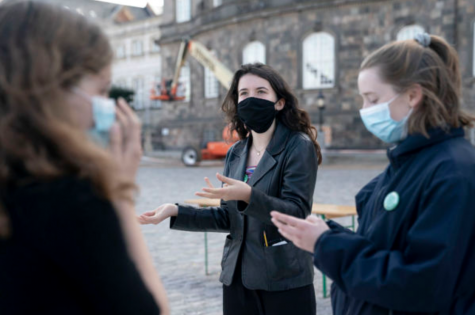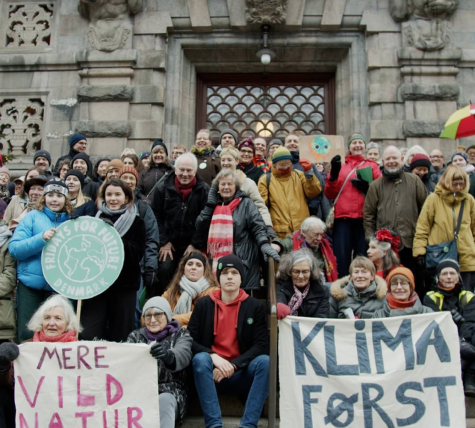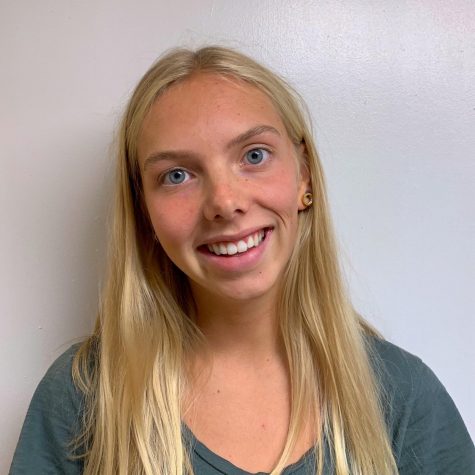A Q&A with a Fridays for Future activist
November 8, 2020
Fridays for Future is an international climate movement founded by Greta Thunberg. Notably in the Mason community, in late 2019 many Mason students attended a Climate March in Washington DC led by Fridays for Future activists. Lasso writer Hedda Jagerskog sat down with Sasha Søndergaard-Hearn, a 16 year old Fridays for Future activisit living in Copenhagen, to talk about the movement.

Have you always been passionate about environmental issues?
Early on, my family wasn’t that into environmental issues. The focus has always been human rights, but, like everyone else, I learned about climate change in school. I didn’t realize the urgency of the issue until I started hearing about the school strikes. What you learn about the climate crisis through society and different institutions is that it’s an obstacle to overcome, or something abstract and distant, rather than something that is directly affecting us. It has been oversimplified to the point where people think turning off the lights and taking shorter showers is enough. Unfortunately, I don’t think that’s enough to make anyone passionate about the movement.
I think Greta [Thunberg] was one of the first people to explain what an emergency [the climate crisis] was and what consequences it had. I never really heard that before. I never heard someone say “the house is on fire” and urge politicians to act the way she did. She inspired me and so many other people, to the point where the movement evolved into mass strikes all over the world. She made me realize that young people really can make a difference and I joined Fridays for Future to do just that.
A couple years back I also became vegan, partly for the environment, but I quickly realized after becoming an activist that changing your own behavior is what we’re taught to do to tackle the climate crisis, but really, what we need to do is point our fingers at the industries. They’re the ones emitting greenhouse gases and they’re the ones at fault here, it’s not the consumers.
How did you get involved in Fridays for Future? What’s your role in the movement in Denmark?
Right now I would classify myself as the lead organizer for the movement, but it’s hard to say because we don’t have any official roles. We don’t have a hierarchy in that way, but rather let the people who’ve been involved longer, like me, take the lead.
How has Fridays for Future evolved during the past months?
I think the obvious obstacle has been COVID, but on a more organizational level, we’ve changed a lot as well. In the start, we focused mainly on school strikes, but we lost some momentum in that. It wasn’t unexpected because we live in a world controlled by trends, even though the climate movement is more than that. With the declining numbers and the increasing COVID safety precautions, we, almost desperately, started looking at other forms of activism. We started working a lot through social media and campaigning.
Another thing we strive for is diversity. We want to lift the voices of indigenous, people of color, women, the disabled, and the poor because they’re just as affected by climate change, if not more, but aren’t heard in the way that privileged white people are. We want to build a platform where everyone is heard.

What are the organization’s goals and how do you work to achieve them?
I can only speak for Denmark as it’s different from country to country, but in general, we want a green, just future. More specifically, we want our government to align itself with the Paris Agreement, we want an 80% reduction of greenhouse gases by 2030, and we want to see the elimination of greenhouse gases by 2035. We also have people looking at some oil projects, as well as working for a “carbon fee” for all products based on how climate-friendly they are.
Along with striking and campaigns, we try to lobby for new and improved policies. We talk to Danish politicians and EU representatives to try to emphasize the urgency of the climate crisis. These are pretty big goals so at times, we do join forces with other climate organizations.
We aren’t really met the way by politicians in a way we’d like. They don’t listen or act upon what we are saying to the extent necessary. Denmark, like almost all other countries, is still going in the wrong direction. When we’ve met with the climate minister and the prime minister, they thank us for our work, but don’t take what we say to heart.
Sometimes it can be very demotivating and lonely when people make you feel like your feelings aren’t valid. On the other hand, it can also create a kind of anger or fuel, which can actually be good for the movement. It’s just important to have a community to share our feelings and frustration with.
Do you feel like the movement has been “put on the back burner” or so to speak?
Yes, I do think so. The biggest impact it has had on us is the loss of community. The climate movement relies so heavily on groups rather than individuals, but because of COVID-19, people haven’t had the chance to meet.
How do you deal with older generations trying to belittle you?
You know, we’re all born into different generations, and I think older people have grown up thinking that the “good life” is based on flying and traveling and those kinds of things, while our generation weigh the consequences of those activities more heavily. So when they continue living in a careless way, it can feel like they don’t care about our future.
We are continually met with negative comments, which can be humiliating, especially when they come from people we look up to, like parents for example.
I think we need to erase the wall that exists between generations and realize that we live in the same world- a world in which the money in our pocket is the most important thing, rather than the well-being of our planet. We all need to come together and change some of the structural issues that are polluting the environment.
If you had all the world leaders in one room, what would you tell them?
There are a million things to be said, but I think I’d tell them that right now, we are standing before the biggest crisis that humankind has ever faced and that they have the power to make a change. So stop playing with us, stop feeding us lies and telling us that everything is going to be okay, when you really know that it’s not true. It’s time to stop prioritizing economic growth. You need to act now, before it’s too late.








